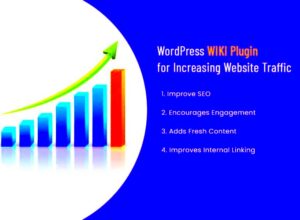WordPress plugins are powerful tools that can greatly enhance your website’s functionality and performance. Essentially, they are like apps for your WordPress site, designed to add specific features without requiring any coding knowledge. This means that whether you want to improve your website’s SEO, increase its speed, or add social sharing buttons, there’s probably a plugin that can help you achieve that. With over 50,000 plugins available in the
Understanding the Importance of Traffic for Your Website

When it comes to running a successful website, traffic is everything. Here’s why:
- Increased Visibility: More traffic means that more people are seeing your content. This is crucial if you aim to establish your brand and reach a wider audience.
- Higher Conversion Rates: The more visitors your site gets, the higher the chances of converting those visits into leads or sales.
- Improved Search Engine Ranking: Websites with more traffic often rank better on search engines, making it easier for potential visitors to find you.
- Enhanced Credibility: A site that attracts more visitors is often seen as more credible and trustworthy by users.
Types of Traffic: It’s essential to understand that not all traffic is equal. Here’s a quick breakdown:
| Type of Traffic | Description |
|---|---|
| Organic Traffic | Visitors who find your website through search engines. |
| Direct Traffic | Users who type your URL directly into their browser. |
| Referral Traffic | Visitors coming from links on other websites. |
| Social Traffic | Users who arrive at your site via social media channels. |
Understanding these traffic types can help you better strategize how to leverage WordPress plugins effectively to boost your visitor numbers!
How WordPress Plugins Can Enhance SEO
Boosting your website’s visibility is crucial, and that’s where WordPress plugins come into play. These handy tools can significantly improve your Search Engine Optimization (SEO), which is essential for attracting organic traffic. Here’s how they work their magic:
- Keyword Optimization: Many SEO plugins like Yoast SEO and All in One SEO Pack help you optimize your content by suggesting relevant keywords. They guide you on keyword placement, helping search engines understand your content better.
- Meta Tags Management: These plugins allow you to edit meta titles and descriptions easily. By crafting compelling snippets, you improve your click-through rates from search engine results.
- Sitemap Creation: SEO plugins automatically generate XML sitemaps which help search engines index your site more efficiently. This means your new content gets discovered quickly!
- Content Analysis: Many SEO tools offer in-depth analysis of your content. They provide suggestions to enhance readability, structure, and keyword density, ensuring you’re on the right track.
- Redirects Management: Plugins like Redirection allow you to manage 301 redirects, which is essential for maintaining link integrity and preventing link rot. This is vital for preserving SEO rankings.
- Image Optimization: Plugins can optimize images by compressing them and adding alt text automatically, which not only improves page load times but also contributes to SEO.
By leveraging these features, WordPress plugins act as your personal SEO assistant, making it easier to climb the search engine rankings and boost your traffic. In the competitive online landscape, using these plugins is almost a no-brainer!
Plugins for Social Media Integration
In today’s digital age, social media is a game-changer for driving traffic to your website. Thankfully, WordPress plugins offer seamless integration with various social platforms, making it easy for you to harness their power. Here’s how these plugins can help your website get noticed:
- Social Share Buttons: Plugins like Social Warfare or AddThis add share buttons to your posts, allowing visitors to easily share your content on their social media accounts. The more shares you get, the more visibility you gain.
- Auto-Posting: Plugins like Revive Old Posts can automatically share your new or old content on social networks, keeping your audience engaged without requiring constant manual effort.
- Embed Feeds: You can use plugins such as Smash Balloon to embed your social media feeds directly into your website. This provides fresh content and keeps your site dynamic and engaging.
- Social Login: Some plugins allow users to log in to your site using their social media accounts. This can increase user registrations and reduce friction during the sign-up process.
- Analytics Tracking: Plugins can help you track how well your content is performing on social media. This data is invaluable for fine-tuning your marketing strategy.
Utilizing these social media integration plugins will not only help in growing your audience but also encourage interaction with your content. By bridging the gap between your website and social platforms, you stand to boost traffic significantly and engage with your audience in new ways.
Utilizing Analytics Plugins to Monitor Traffic
When it comes to understanding your website’s traffic, analytics plugins are like having a magnifying glass over your data. These tools help you dive deep into who’s visiting your site, how they’re getting there, and what content they’re engaging with. So, how do these plugins work and why are they essential for boosting your traffic?
First off, analytics plugins track visitor behavior on your site. They collect data on visitor demographics, the pages they visit, their time spent on your site, and more. With this information, you can identify which content is resonating with your audience. Here are some popular analytics plugins to consider:
- Google Analytics for WordPress: Integrates seamlessly with your site, providing detailed reports on traffic sources, user behavior, and conversions.
- MonsterInsights: Offers user-friendly reports directly on your WordPress dashboard, so you don’t have to log in to Google Analytics every time.
- Jetpack: This multi-functional plugin includes site stats that give you a quick overview of your traffic right on your admin dashboard.
Tracking your traffic is crucial, but it’s not just about collecting data. You need to analyze it to make informed decisions. For example, if you notice a spike in visits from social media, you might want to invest more time into that channel. Or if a certain blog post is turning visitors into subscribers, consider creating more content around that topic!
In summary, utilizing analytics plugins can significantly enhance your site’s performance by helping you understand your audience better. By monitoring traffic closely, you can adapt your strategies and ultimately boost traffic over time.
Content Optimization Plugins
Alright, let’s talk about content optimization plugins—your best friends in making sure your content not only gets seen but also engages your visitors effectively. Think of these plugins as your personal editors ensuring that every piece of content on your site is polished and optimized for search engines.
Content optimization plugins come packed with features that help improve the readability, SEO, and overall quality of your posts. Here’s why they’re super useful:
- SEO Support: Many optimization plugins, like Yoast SEO, guide you in using the right keywords, optimizing meta descriptions, and crafting SEO-friendly URLs.
- Readability Checks: Plugins can analyze sentence length, passive voice usage, and more, helping you write clearer, more engaging content.
- Image Optimization: Tools like Smush can help you compress images without losing quality, improving load times and enhancing user experience.
Here’s a quick comparison of a few popular content optimization plugins:
| Plugin | Best For | Key Features |
|---|---|---|
| Yoast SEO | SEO Optimization | Keyword analysis, readability analysis, XML sitemaps |
| Rank Math | Advanced SEO | Custom schema, local SEO, automated image SEO |
| All in One SEO Pack | Comprehensive SEO | XML sitemaps, social media integration, spam protection |
In conclusion, using content optimization plugins is crucial for ensuring your blog posts are not only found by search engines but also engaging for readers. By enhancing your content with these tools, you set a solid foundation to attract more traffic and keep your audience coming back for more!
7. Performance and Speed Plugins Impact on Traffic
When it comes to driving traffic to your WordPress site, performance and speed are key players. Did you know that users are likely to leave a website if it takes longer than three seconds to load? This is where performance and speed plugins come into the picture. These plugins are designed to optimize your website’s speed, create a better user experience, and ultimately improve your site’s visibility on search engines.
Here’s how performance plugins can boost your traffic:
- Faster Loading Times: Plugins like WP Rocket or W3 Total Cache use techniques such as caching and minification to reduce loading times. A faster site means lower bounce rates, meaning visitors are more likely to stick around and explore your content.
- Improved User Experience: A smooth, fast-loading website keeps users engaged. When visitors find what they’re looking for quickly, they’re more likely to share your content, which in turn drives more traffic back to your site.
- SEO Benefits: Search engines like Google prioritize faster websites in their ranking criteria. Plugins that enhance your site speed can boost your search engine rankings, resulting in more organic traffic.
- Mobile Optimization: With mobile traffic constantly on the rise, performance plugins often include mobile optimization features, ensuring that your site runs smoothly on all devices.
In summary, investing in performance and speed plugins is not merely an option; it’s a necessity for those serious about boosting their site traffic. The right plugin can enhance your website’s performance, keeping users happy while also appealing to search engines.
8. Case Studies: Success Stories of Plugins Increasing Traffic
When considering whether to use WordPress plugins to boost your site traffic, looking at real-life success stories can be inspiring. Many website owners have witnessed significant traffic increases by implementing the right plugins. Let’s explore a couple of case studies that highlight these successes.
| Website | Plugin Used | Traffic Increase |
|---|---|---|
| ExampleBlog.com | Yoast SEO | 150% over 6 months |
| FastEats.com | WP Rocket | 200% in 3 months |
| EcoAwareness.org | Social Warfare | 100% over 1 year |
1. ExampleBlog.com implemented the Yoast SEO plugin, which helped them optimize their content for search engines. After a consistent effort over six months, they reported a staggering 150% increase in traffic as more users discovered their site through Google search.
2. FastEats.com, a food blog, decided to improve their site speed using WP Rocket. Within just three months, they experienced a 200% traffic increase because the faster load times made it easier for users to navigate, explore recipes, and share their favorites.
3. Finally, EcoAwareness.org leveraged the Social Warfare plugin to enhance their social sharing capabilities. Within a year, their traffic surged by 100% as users were encouraged to share content more easily across social media platforms.
These success stories emphasize that with the right plugins tailored to your needs, boosting your website’s traffic is absolutely attainable. People are reaping the benefits, and so can you!
Choosing the Right Plugins for Your Needs
When it comes to selecting the right WordPress plugins, the process can become overwhelming, given the thousands available. However, choosing plugins that align with your specific needs can significantly enhance both the performance of your website and your ability to attract traffic. Here’s a simple guide to making the right choices:
- Identify Your Goals: Before you dive into the world of plugins, clarify what you aim to achieve. Are you looking to improve SEO, increase social sharing, or perhaps enhance site performance? Understanding your goals can help pinpoint the types of plugins you need.
- Research and Read Reviews: Not all plugins are created equal. Spend some time reading user reviews and ratings to gauge the effectiveness of a plugin. Websites like WordPress Plugin Repository offer valuable insights from real users.
- Check Compatibility: Ensure that the plugins you consider are compatible with your theme and other plugins already installed. A plugin that integrates well is crucial for maintaining site stability.
- Prioritize Quality over Quantity: It’s tempting to install multiple plugins, thinking that more is better. However, too many plugins can slow down your site. Instead, focus on a few high-quality plugins that serve important functions.
- Keep Your Budget in Mind: While there are many free plugins, some premium options provide better features and support. Determine your budget and assess which plugins offer the best value for your money.
By following these tips, you can make informed decisions about which plugins will help drive traffic to your WordPress site without compromising performance.
Common Mistakes to Avoid with WordPress Plugins
Using WordPress plugins can be extremely beneficial, but there are some common pitfalls that many website owners encounter. By being aware of these mistakes, you can better navigate your plugin choices and use them effectively. Here’s what to watch out for:
- Overloading on Plugins: One of the biggest mistakes is installing too many plugins. More plugins mean more potential conflicts, and a cluttered site can slow down performance. Aim for a streamlined selection that meets your needs.
- Ignoring Updates: Many users forget to update their plugins regularly. Keeping plugins updated is crucial not only for security but also for ensuring that features work correctly. Regular updates can prevent compatibility issues and enhance performance.
- Neglecting Security: Some plugins may introduce vulnerabilities to your site. Stick to reputable plugins, and always check for security audits before installation. Consider using security plugins that safeguard against common threats.
- Not Testing: Launching a new plugin without testing it first can lead to compatibility issues or unintended consequences. Always test new plugins on a staging site before implementing them on your live site.
- Forgetting About Your Audience: Sometimes, in the quest for functionalities, website owners forget to consider the user experience. Ensure the plugins you choose enhance usability and do not overwhelm your visitors.
Avoiding these mistakes can help you maintain a smooth-running site while effectively leveraging plugins to boost traffic and enhance overall performance. Remember, it’s all about making informed choices!
Conclusion: Are Plugins Worth It for Boosting Traffic?
In the ever-evolving landscape of digital marketing, WordPress plugins have emerged as essential tools for website owners aiming to enhance their online presence and increase traffic. Here’s a detailed look at the effectiveness of these plugins in driving more visitors to your site:
- SEO Optimization: Plugins like Yoast SEO and All in One SEO Pack assist in optimizing content, improving search engine rankings and driving organic traffic.
- Social Media Integration: Tools such as Social Snap and Monarch help streamline content sharing across various platforms, enabling wider reach and engagement.
- Analytics Monitoring: Plugins like MonsterInsights and Google Analytics Dashboard allow users to track traffic sources and understand user behavior, facilitating informed decisions for future marketing strategies.
- Performance Enhancement: Caching plugins like W3 Total Cache and WP Super Cache improve site speed, which is critical for retaining visitors and improving SEO standings.
- Email Marketing: Tools like Mailchimp for WordPress and OptinMonster can help build an email list, driving repeat visits through strategic email campaigns.
Nonetheless, it’s important to assess the quality and compatibility of plugins in relation to your specific needs. Remember that too many plugins can lead to bloated site performance, which can negate their benefits. By selecting essential and well-supported plugins, website owners can significantly enhance their site’s functionality and, ultimately, its traffic potential. Therefore, the answer to whether plugins are worth it is a resounding yes, provided they are used judiciously.



